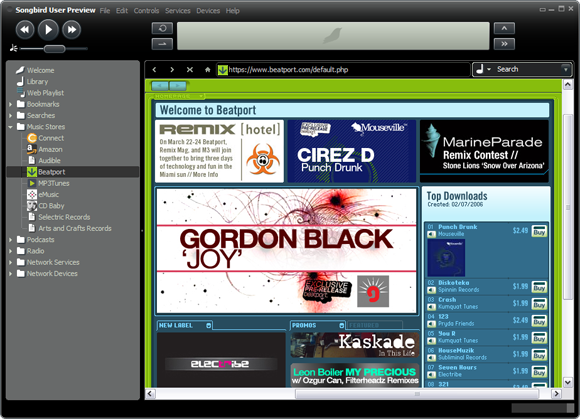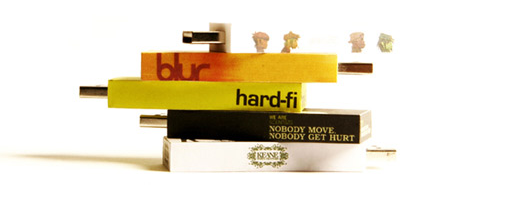I hate ending on sour notes. So, instead, let’s look at some positive opportunities for music distribution. Indie labels and music makers alike on this site I know have no love for Digital Rights Management, but let’s look at some alternatives, from Mozilla-based iTunes alternatives to music on sticks (and reasons to dump iTunes).

Reason to Criticize iTunes: Okay, first, let’s get this out of the way: yes, while Apple has done a great job of supporting interoperable standards everywhere else, their iTunes/iPod combination is roughly as restrictive as the Windows Media platform. And that has caused it, rightfully, to be the target of criticism in recent weeks. I’m not sure why it took a few people dressing up in silly biohazard suits in San Francisco to get Business Week to notice, but Apple is using its DRM technology (FairPlay) to lock customers into the iPod and iTunes. Is this the record industry’s fault? No, say the people in silly suits, because Apple’s own legal team has said Apple will continue to use FairPlay with or without the record industry. (On that issue, I tend to agree with them. On wearing silly suits around San Francisco Apple stores, um, well, I can usually find more urgent issues to protest. Like wars and stuff. But it did get them into Business Week.) Is Apple worse, for locking its customers into a single store (iTunes) and refusing to license its DRM (FairPlay)? Is Microsoft worse, for reinventing the way music gadgets get connected (MTP) and building a single-platform software player (Windows Media Player)? Who cares? The best strategy is to avoid the bad technology and use the good.
Bend iTunes to Your Will: As many have observed, there’s no reason not to burn your iTunes purchases to CD, giving you an instant backup and the possibility of re-ripping minus DRM. (The former is allowed by your license; the latter isn’t, but tell them I said it’s okay. I’ll let my lawyers deal with the Digital Millenium Copyright Act.) And many readers here are perfectly happy with iTunes using music ripped from their CD collection and bought from independent online sources like Bleep. Downsides: no FLAC or OGG support, and there’s no reliable way to add that, either. Upsides: Apple runs on Windows, Mac, and even (via WINE) Linux, and it’s still the best podcast player around. (I tried open source alternatives but was disappointed.)
Bend your iPod to Your Will: Not only is your iPod perfectly happy playing non-DRM’ed music, but it has some of the best support out there for the Rockbox open source alternative firmware. Rockbox can be dual-booted with the iPod’s native firmware, it adds support for other formats like OGG and FLAC (and many others), adds gapless audio playback, and generally makes the iPod a much better value. Downsides: the iPod still doesn’t support recording, which is why I like the Windows Media devices.
Use an iTunes alternative: With most of the world using iTunes or Windows Media Player, the alternative player market has been, sadly, largely stagnant. But there are some bright spots. Winamp remains the best Windows player, arguably the best player out there period, and thanks to rich community support has lots of extras (including iPod support). I’ve been using the superb open source VLC media player, which runs on just about everything (BeOS, for crying out loud), to listen to higher-quality radio streams like AAC. One example: the eclectic WFPK radio from my hometown of Louisville, KY. Weirdly, these streams don’t seem to work on iTunes, but VLC and Winamp handle them perfectly. Many of the Linux-native players seem a little too barebones to me (though you may prefer that), but Amorak on KDE is probably the most feature-rich player on any platform. Many of those features are overkill, but native last.fm support is nice, and the organization features are top-notch. (It runs just fine under Gnome, too.)

Songbird, the Mozilla Music Player: The most promising new entrant is Songbird, currently Windows-only but with a Mac release coming any day now and Linux later this year, based on the Mozilla web engine that drives Firefox. Songbird actually holds some benefits for musicians. Websites can publish playlists to this player, so instead of being locked into a single music store (hello, iTunes and Windows Media), you can go to any website you like and discover new music. It finally restores the “pull” nature of the Web as opposed to the “push” of podcasting, and it’s a feature I’ll be sure to support on CDM in the future. Progress now is pretty slow, but so is all software development; it’s fun to use on Windows at least as a secondary player. If the online music discovery isn’t enough reason for you, their roadmap for universal format support and universal cross-platform support should.
Songbird certainly has the right idea conceptually, too; see their musings on Tim Berners-Lee and why online media players, like Web browsers, should let you see the content you want.

Music on Sticks: With the ephemeral quality of online music distribution making people feel less and less like they own music, musicians may find new, creative ways of making their product tangible. I think the relative confusion over distribution formats could actually yield some new opportunities here. One thought: put music on sticks. Flash memory sticks, that is. Josh Spear this week looks at a design concept for flash memory distribution, as pictured at the top of this story; there’s no production model there, but I love the design. I’ll bet people could think of creative containers for the sticks, too. (Though, please, don’t use a decapitated bear.) One record label has even tried this out: net label Magnatune released their music on a flash drive in various sizes a couple of years ago. You could think of it as a flash drive with free music, or music with a free flash drive. I could even see some of these having players or speakers built-in. The bottom line here isn’t the specific idea, or even a single format: it’s about adding the perception of material value. In Japan, where commercial CDs have ballooned to prices around US$30, labels are smart enough to bundle exclusive extras like plush toys. Music + swag? Hey, why not. I’ll bet you sell more of your album at your next gig if you try something like that.
Going Creative Commons: Other musicians are responding to increasingly-restrictive DRM by releasing music that’s less restrictive, friendly for sharing, remixing, and incorporating into other people’s music. Part of the reason why I think this might work is that it’s an incredibly old idea. Ironically, in musical cultures like the folk music of Ireland performing rights organizations have been trying to talk musicians out of letting their songs be shared, despite the fact that sharing (and changing) other people’s music was how the tradition got started in the first place. There’s plenty to say about this issue, but I’m going to hope that people like reader / label owner Andrew Garton fill us in. (Andrew tells us he’s off to the Creative Commons iSummit, so, Andrew, I do expect a full report. Especially because Rio is infinitely cooler than the places I’ve had to attend conferences lately!)
Here are the rules: no more talk about why the RIAA, labels, iTunes, iPods, DRM, FairPlay, Windows Media, Windows, mean people, SUVs, fossil fuels, global warming, planet-killing asteroids, and other buzzkill topics suck. (Yeah, yeah, I know — I brought it up. I promise I’ll change the subject now, too.) I want to hear more creative ideas for sharing and distributing our music. I’m sure we can come up with something — and your ideas are definitely better than those from Microsoft, Apple, and the majors. (Big surprise.)